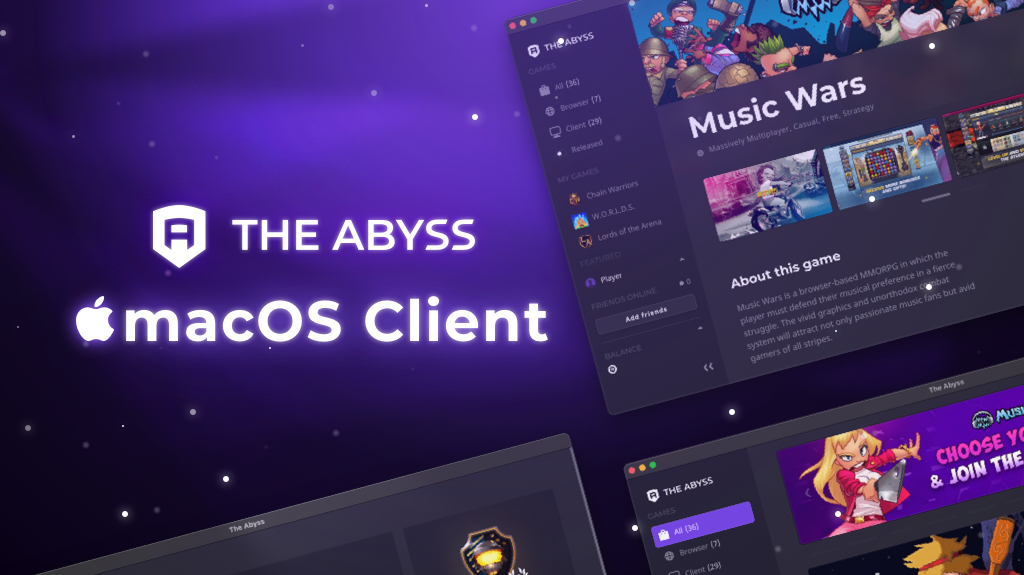In Abyssam: A Story Of Resilience Mac OS
- A lot of the games I own have messages about being 32-bit, and how they're not supported by MacOS Catalina anymore, but a lot of them still work. Valdis Story: Abyssal City is the first game I've tried out that has a pop-up message that prevents me from playing the game. I'm just wondering if this will be remedied in the future or if this is just an L I have to take and move on.
- EmWave2® Standalone Handheld Use Average Customer Rating: Take Charge of How You Feel Release Stress Find Balance Build Resilience We’ll be there with you Free weekly product training calls and videos Sign up for our newsletters, inspiration and special offers Register free for HeartCLoud.com to join the community and get even more videos.
- In Abyssam: A Story Of Resilience Mac Os X
- In Abyssal: A Story Of Resilience Mac Os Sierra
- In Abyssal: A Story Of Resilience Mac Os Update
An award-winning biography of a man whose faith and resilience continues to inspire.On July 19, 1924, Eric Liddell was on top of the world. He was the most famous Briton at the time, having just won the gold in the Olympic 400-meter race. The story of that race―and the one he didn’t run―was told in the popular movie classic Chariots of Fire. Abyssal Agent Alyss follows the story of Alyss, a succubus working as a police officer for the Demon World Police Department. She is tasked with investigating a suspicious location in the human world that's been purchased by a notable crime family (of demonic origin), but. Mar 16, 2021 In an emotional farewell to the Permanent Mission in Geneva on June 22, the members of the Leyte Dance Theater, many of whom had travelled outside the Philippines for the first time, recalled their experiences telling a story of resilience to a foreign audience through entertaining, innovative, and show-stopping dance.
After years of work, Mono can now be built out of the dotnet/runtime repository in a .NET 5-compatible mode! This mode means numerous changes in the available APIs, managed and embedding, as well as internal runtime behavioral changes to better align Mono with CoreCLR and the .NET ecosystem.
One area with multiple highly impactful changes to the runtime internals is library loading. For managed assemblies, Mono now follows the algorithms outlined on this page, which result from the removal of AppDomains and the new AssemblyLoadContext APIs. The only exception to this is that Mono still supports bundles registered via the embedding API, and so the runtime will check that as part of the probing logic.

The managed loading changes are fairly clear and well documented, but unmanaged library loading has changed in numerous ways, some of them far more subtle.
- Dropped support for DllMap
- Unmanaged library loading defaults to
RTLD_LOCAL - Added support for
DefaultDllImportSearchPathsAttribute - On non-Windows platforms, Mono and CoreCLR no longer attempt to probe for A/W variants of symbols
- Default loader log level changed from INFO to DEBUG, and new log entries added for the new algorithm
More detail where appropriate in the sections below.
Dropped support for DllMap
The new unmanaged loading algorithm makes no mention of DllMap, as Mono has removed its functionality almost entirely in .NET 5. DllMap’s XML config files have have been disabled on every platform out of security concerns. The DllMap embedding APIs are also disabled on desktop platforms, though this may change.
In place of DllMap, users are encouraged to utilize the NativeLibrary resolution APIs, which are set in managed code, and the runtime hosting properties, which are set by embedders with the monovm_initialize function.
We recognize that this does not sufficiently cover some existing mono/mono scenarios. If the NativeLibrary APIs are insufficient for your use case, please tell us about it! We’re always looking to improve our interop functionality, and in particular with .NET 6 will be evaluating NativeLibrary, so community input would be greatly appreciated.
Unmanaged library loading defaults to RTLD_LOCAL
A more subtle, yet no less impactful change is that native library loading now defaults to RTLD_LOCAL to be consistent with CoreCLR and Windows, as opposed to our historical behavior of RTLD_GLOBAL. What this means in practice is that on Unix-like platforms, libraries are no longer loaded into a single global namespace and when looking up symbols, the library must be correctly specified. This change prevents symbol collision, and will both break and enable various scenarios and libraries. For more information on the difference, see the dlopen man page.
For an example: historically in Mono on Linux, it was possible to load library foo containing symbol bar, and then invoke bar with a P/Invoke like so:
In Abyssam: A Story Of Resilience Mac Os X
This will no longer work. For that P/Invoke to function correctly, the attribute would need to use the correct library name: [DllImport('foo')]. A lot of code in the wild that was using incorrect library names will need to be updated. However, this means that when loading two libraries containing the same symbol name, there is no longer a conflict.
There have been some embedding API changes as part of this. MONO_DL_MASK is no longer a full mask, as MONO_DL_GLOBAL has been introduced to specify RTLD_GLOBAL. If both MONO_DL_LOCAL and MONO_DL_GLOBAL, are set, Mono will use local. See mono/utils/mono-dl-fallback.h for more info.
This also means that dynamically linking libmonosgen and attempting to resolve Mono symbols from dlopen(NULL, ...) will no longer work. __Internal has been preserved as a Mono-specific extension, but its meaning has been expanded. When P/Invoking into __Internal, the runtime will check both dlopen(NULL) and the runtime library in the case that they differ, so that users attempting to call Mono APIs with __Internal will not have those calls break.
In Abyssal: A Story Of Resilience Mac Os Sierra

In Abyssal: A Story Of Resilience Mac Os Update
Added support for DefaultDllImportSearchPathsAttribute
Mono now supports the DefaultDllImportSearchPathsAttribute attribute, which can be found in System.Runtime.InteropServices. In particular, passing DllImportSearchPath.AssemblyDirectory is now required to have the loader search the executing assembly’s directory for native libraries, and the other Windows-specific loader options should be passed down when appropriate.
And that’s it! If you have any further questions, feel free to ping us on Discord or Gitter.